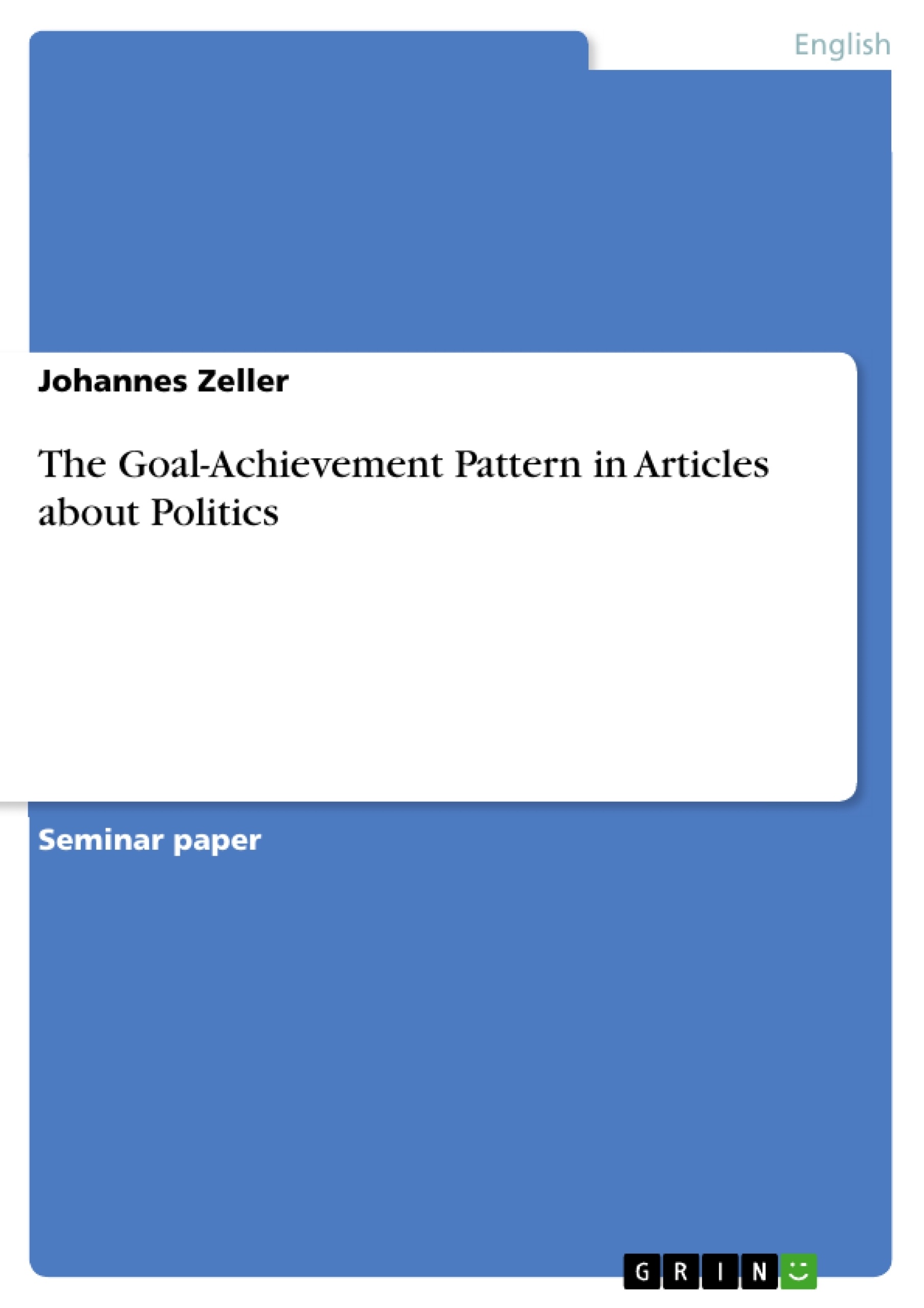This seminar paper contains a linguistic analysis of argumentation-patterns in newspaper articles on politics. Reports on the Iranian nuclear program are critically examined, paying particular attention to the triangle language-poltics-media. Hoey's Goal-Achievement-Pattern has been employed as the main methodology.
Inhaltsverzeichnis (Table of Contents)
- Introduction
- Background
- Characteristics of articles about politics
- The role of journalism
- Does the Iranian President really want Israel to be \"wiped off the map\"?
- Political goals and language
- Rhetorical devices
- Patterns of text organisation
- The Problem-Solution Pattern
- The Goal-Achievement Pattern
- Analysis of a current article on the Iranian nuclear program
- Conclusion
Zielsetzung und Themenschwerpunkte (Objectives and Key Themes)
This paper aims to analyze a linguistic pattern in an article about politics and examine the relationship between language, politics, and media. The author draws on their experience in media companies and interest in journalism to explore the role of language in shaping political discourse.
- The relationship between language, politics, and media.
- Linguistic patterns in articles about politics, specifically the goal-achievement pattern.
- The role of journalists in shaping the presentation of political information.
- The use of rhetoric and linguistic techniques to achieve political goals.
- The analysis of a current article about the Iranian nuclear program.
Zusammenfassung der Kapitel (Chapter Summaries)
- Introduction: The author outlines the paper's objective to analyze the goal-achievement pattern in articles about politics and explore the connection between language, politics, and media.
- Background: This section provides general information on articles about politics, highlighting the importance of journalistic backgrounds and the connection between media, language, and politics. It examines the role of journalists, the impact of political goals on language use, and the use of rhetoric and linguistic devices.
- Characteristics of articles about politics: The author discusses the high degree of intertextuality in political articles, often relying on prior knowledge of political figures and events. The example of a Martian reader unable to comprehend an Austrian newspaper article illustrates this concept.
- The role of journalism: This section analyzes the role of journalists as both producers and receivers of political information. The author highlights the responsibility of journalists to present "the other side" and the importance of accuracy in reporting.
- Does the Iranian President really want Israel to be "wiped off the map"?: This section provides a case study demonstrating how misinterpretations in translation can shape public opinion and the perception of political figures. It discusses the potential for biased representation of political goals and the impact of such misinterpretations.
- Political goals and language: The author examines the interplay between politics and language, highlighting the role of language in shaping political action. It explores the use of linguistic techniques like absent quantifiers, nominalization, and adjectivization to convey political goals with varying degrees of clarity and specificity.
Schlüsselwörter (Keywords)
Key concepts explored in this paper include: political discourse, journalistic practices, media representation, linguistic patterns, goal-achievement pattern, rhetoric, political goals, language use, intertextuality, translation, political rhetoric, and the Iranian nuclear program.
Frequently Asked Questions
What is Hoey's Goal-Achievement Pattern?
It is a linguistic methodology used to analyze how texts are organized around a specific goal, the actions taken to achieve it, and the evaluation of the outcome.
How does language influence political reporting?
Linguistic devices like nominalization or absent quantifiers can be used to shape public perception of political events and goals, often reflecting the journalist's or medium's bias.
What is "Intertextuality" in political articles?
Intertextuality refers to the way political texts rely on the reader's prior knowledge of other texts, events, and historical contexts to be fully understood.
How can translation errors impact international politics?
The paper uses the example of the Iranian President's quotes to show how specific translations (e.g., "wiped off the map") can drastically alter international diplomatic relations and public opinion.
What is the role of a journalist in the triangle of language-politics-media?
Journalists act as gatekeepers who select, interpret, and present political information, thereby constructing the reality that the public perceives.
- Quote paper
- Johannes Zeller (Author), 2008, The Goal-Achievement Pattern in Articles about Politics, Munich, GRIN Verlag, https://www.grin.com/document/276369



